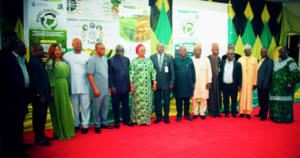Federal Government of Nigeria has reiterated its resolve to implement a BIOETHANOL project that would promote sustainable economic growth and positively impact the nation’s Gross Domestic Product, GDP, through the development of the cassava Bio-economy, as well as other Bio-resources. Bioethanol is a high octane number biofuel produced from fermentation of corn, cassava, potatoes, grain (wheat, barley and rye), sugar beet, sugar cane and vegetable residues.
The Permanent Secretary, Budget and National Planning, Engr. Nebeolisa Anako, made this known during the North Central Zonal version, of the Sensitization Workshop on Strategic Implementation of the Bioethanol Project, holding currently, at Keffi, Nasarawa State.
 He described Bioethanol as one of the initiatives of the Federal Government to achieve its aspiration of bringing about higher GDP growth while also significantly reducing unemployment through the creation of meaningful opportunities for the youth. According to him, ”the Bio-economy Policy aims at promoting sustainable economic growth and development by creating a Bio-based economy that will contribute to the job creation, poverty reduction, and increased access to food and energy”.
He described Bioethanol as one of the initiatives of the Federal Government to achieve its aspiration of bringing about higher GDP growth while also significantly reducing unemployment through the creation of meaningful opportunities for the youth. According to him, ”the Bio-economy Policy aims at promoting sustainable economic growth and development by creating a Bio-based economy that will contribute to the job creation, poverty reduction, and increased access to food and energy”.
Explaining further on the initiative, the Permanent Secretary said that it was pertinent to look at the Bio-economy response and how it could contribute to the deceleration of the rising food insecurity, he added that “The country, at this time, needs an approach that will increase food production, youth employment, and increased growth through the provision of industrial feedstock and exportable products to boost our economy. To achieve this, one strategic pathway is to develop the Cassava Bio-ethanol Value Chain. This becomes even more imperative, given the recent removal of subsidy on Petroleum products, re-evaluation of the Naira through the merging of official and non-official exchange windows.”
Engr. Nebeolisa pointedout that, the development of the Bioeconomy value chain remained a veritable pathway to assuage the economic impacts on citizens and for sustained development. Another objective of the Bio-ethanol Value Chain according to him, was to demonstrate the efficacy of private sector-led approach in promoting investment in renewable Biomass, create wealth, provide jobs, reduce poverty, improve food security and nutrition as well as improved environmental management.
He maintained that the intention of the sensitization workshop was to develop modalities for the implementation of the Bio-ethanol project as well as identify the key stakeholders required for the implementation of the entire value chain, and he expressed hope that the workshop would help to publicise the project to stakeholders for their buy-in and participation.
Anako commended the stakeholders from relevant Federal Ministries, Department and Agencies (MDAs) for their collaboration and enduring partnership in developing the Bio-economy Policy, as a Ministerial deliverable that was captured in the National Development Plan (NDP) 2021 – 2025, and that the framework would employ a Triple-Helix Knowledge Transfer Partnership in its implementation through the Academia, Research and Development Institutes,Farmers, the Private Sector and Government MDAs as well as the Civil Society, Development Partners and Development Finance Institutions.
The Vice Chancellor of Nasarawa State University, Keffi, Prof. Suleiman Bala Mohammed, revealed that the workshop reflected the pressing need to harness the power of the bioeconomy, particularly, in the context of the North Central region of the country that was rich in agricultural heritage, advising that the region must capitalize on its agricultural resources to unlock economic opportunities, create jobs, and foster inclusive growth.
He added that with collective efforts of relevant stakeholders in the agricultural value chain, the North Central could play the lead in harnessing the power of cassava to drive transformative change, not only in Nigeria but also across the continent and beyond, and he commended the Federal Ministry of Finance, Budget, and National Planning, for organizing the workshop for the implementation of the full cassava value chain project and its unwavering commitment to the advancement of sustainable solutions.
The Vice Chancellor, Federal University, Lafia, Prof. Shehu AbdulRaham represented by the Director, Centre for Energy Studies Prof. Emmanuel KwonNdung expressed the hope that the various sessions at the sensitization workshop would further expose participants to mutual inter-institutional goals of promoting the bio-economy.
He added that, the University remains committed to Research and development on sustainable alternative energy sources, and he also disclosed that the University had established the Centre for energy studies with a vision to being a world class Centre for excellence in harmonizing alternative energy for socio economic development.
Also speaking, Prof. Ken Ife, the Consultant of the Cassava Bio-ethanol Value Chain Project, said only 7 percent of Nigerian graduates get jobs after graduation, adding that there was an urgent need to create new initiatives aimed at addressing youth unemployment in the country.
In her closing remarks, the Director of Economics Growth Mrs. Elizabeth Egharevba applauded the Federal Government for approving the project and making more opportunities available for Nigerians and she underscored the need to engage universities to produce young bio-entrepreneurs and extension service agents.
OLUDE OMOLADE
PRINCIPAL INFORMATION OFFICER
FOR: DIRECTOR, INFORMATION (BNP)
05/06/2023
